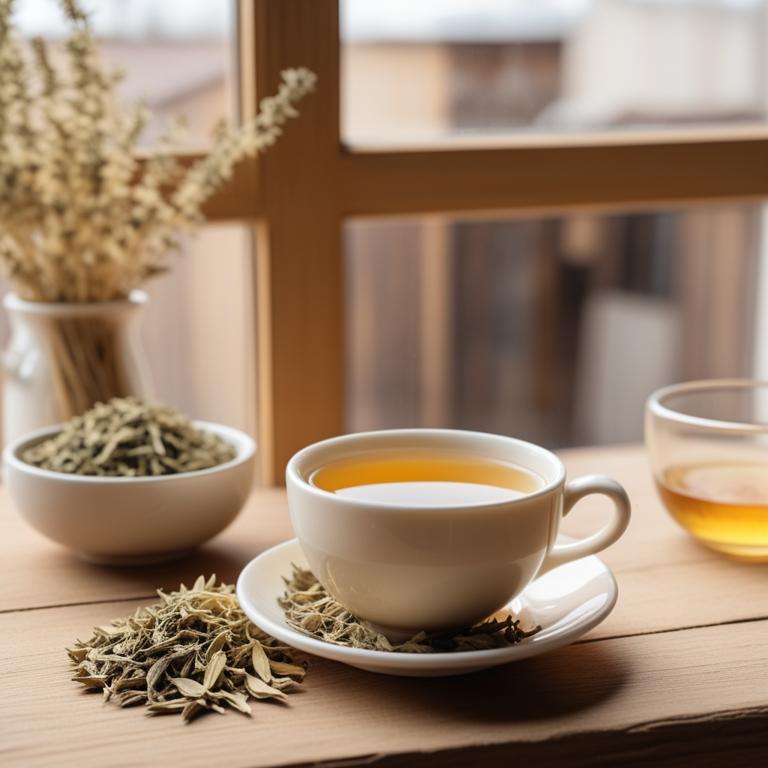7 Herbal Teas For Altitude Sickness

Herbal teas can be a great natural remedy for altitude sickness.
At high elevations, the air is thinner, and your body needs to work harder to get the oxygen it needs. This can cause headaches, fatigue, and nausea. Herbal teas like Ginkgo biloba can help by improving blood flow and reducing inflammation in the body. Ginkgo biloba is an ancient herb that has been used for centuries to improve circulation and reduce the risk of blood clots. Astragalus membranaceus, another herb commonly used in herbal teas, has anti-inflammatory properties that can help reduce swelling and pain in the body. It also has antioxidant properties that can help protect the body from damage caused by free radicals.
This can be especially helpful at high elevations where the sun's rays are stronger and can cause more damage to the skin. Ginger, or Zingiber officinale, is a popular herb used in many herbal teas. It has anti-inflammatory properties that can help reduce nausea and stomach upset, which are common symptoms of altitude sickness. Ginger also has a warming effect on the body, which can help to increase circulation and reduce pain. Drinking herbal teas like these can bring many benefits to your life. Not only can they help to relieve the symptoms of altitude sickness, but they can also help to reduce stress and anxiety, promote better sleep, and boost your immune system.
By incorporating herbal teas into your daily routine, you can feel more energized and focused, and better equipped to handle the challenges of high-altitude travel.
- 1. Ginkgo biloba
- 2. Astragalus membranaceus
- 3. Zingiber officinale
- 4. Echinacea purpurea
- 5. Rhodiola rosea
- 6. Schisandra chinensis
- 7. Panax ginseng
1. Ginkgo biloba

Ginkgo biloba teas contains bioactive constituents such as flavonoids and terpenoids, which have anti-inflammatory properties.
These compounds help to improve blood flow and oxygen delivery to the body's tissues, making it easier to adapt to high altitudes. The ginkgolides in ginkgo biloba also have a vasodilating effect, which means they help to widen blood vessels and reduce blood pressure. This increased blood flow and oxygen delivery can help to alleviate the symptoms of altitude sickness, such as headaches and shortness of breath.
By improving circulation and reducing inflammation, ginkgo biloba teas may help to make high-altitude environments more manageable.
- Gather 1 teaspoon of dried Ginkgo biloba leaves and 1 cup of boiling water.
- Steep the Ginkgo biloba leaves in boiling water for 5-7 minutes.
- Strain the mixture into a cup and discard the leaves.
- Add honey or sugar to taste, if desired.
- Drink the tea 2-3 times a day to help alleviate altitude sickness symptoms.
2. Astragalus membranaceus

Astragalus membranaceus teas contains bioactive constituents like flavonoids, saponins, and polysaccharides that help alleviate symptoms of altitude sickness.
These compounds have anti-inflammatory properties, which reduce swelling in the lungs and improve oxygen delivery. Astragalus also contains sesquiterpenes that help protect against oxidative stress caused by high altitude. Additionally, its adaptogenic properties help the body adapt to the change in environment and reduce the severity of altitude sickness symptoms.
By drinking Astragalus membranaceus teas, individuals can alleviate symptoms such as shortness of breath, headaches, and fatigue associated with altitude sickness.
- Gather Astragalus membranaceus root, a teaspoon of dried root, a cup of boiling water, and a tea infuser or strainer.
- Measure 1 teaspoon of dried Astragalus membranaceus root and place it in the tea infuser or strainer.
- Pour 1 cup of boiling water over the dried root and let it steep for 5-7 minutes.
- Strain the tea into a cup and discard the root. You can add honey or lemon to taste.
- Drink 2-3 cups of the tea per day to help alleviate altitude sickness symptoms.
3. Zingiber officinale

Zingiber officinale teas contains active constituents like gingerol and shogaol.
These compounds have anti-inflammatory properties that can help alleviate the symptoms of altitude sickness. Gingerol and shogaol can also reduce nausea and vomiting, which are common problems at high altitudes. The warming properties of ginger can also help improve blood circulation, allowing the body to adapt to the lower oxygen levels.
By drinking Zingiber officinale tea, you may be able to alleviate some of the symptoms associated with altitude sickness and improve your overall comfort.
- Gather 1 teaspoon of dried Zingiber officinale root powder and 1 cup of boiling water.
- Add the Zingiber officinale root powder to a tea infuser or a heat-resistant cup.
- Pour 1 cup of boiling water over the powder and let it steep for 5-7 minutes.
- Strain the tea into another cup and discard the solids.
- Drink 1-2 cups of the tea 2-3 times a day, as needed, to help alleviate altitude sickness symptoms.
Zingiber Officinale Tea on Amazon
FGO Organic Ginger Tea, 100 Count, Eco-Conscious Tea Bags, Caffeine Free, Packaging May Vary (Pack of 1)
Disclaimer: We earn a commission if you click this link and make a purchase at no additional cost to you.
4. Echinacea purpurea

Echinacea purpurea teas contains a group of compounds called alkylamides and caffeic acid derivatives.
These compounds help to reduce inflammation and improve blood flow to the brain, which can be beneficial for people experiencing altitude sickness. The tea's anti-inflammatory properties, particularly due to the presence of kaempferol and quercetin, may help alleviate some symptoms of altitude sickness. Additionally, the tea's ability to stimulate nitric oxide production, thanks to the presence of caffeic acid and rosmarinic acid, can help improve blood flow to the brain, reducing the risk of altitude sickness.
By consuming Echinacea purpurea teas, people traveling to high altitudes can potentially reduce their risk of experiencing altitude sickness.
- Gather 1 cup of dried Echinacea purpurea flowers and 1 cup of boiling water.
- Measure 1 tablespoon of dried Echinacea purpurea flowers into a tea infuser or a heat-resistant cup.
- Pour 1 cup of boiling water over the Echinacea purpurea flowers.
- Let the mixture steep for 5-7 minutes, then strain the tea into a cup.
- Drink the tea 2-3 times a day for altitude sickness relief.
5. Rhodiola rosea

Rhodiola rosea teas contains the bioactive constituents rosavin, rosin, and salidroside.
These compounds have adaptogenic properties, which help the body adapt to changing conditions. The rosavin and salidroside in Rhodiola rosea teas have been shown to improve oxygen delivery to the body's tissues, helping to alleviate symptoms of altitude sickness. Additionally, the rosin in Rhodiola rosea teas has antioxidant properties, which can help protect the body from oxidative stress caused by high altitude.
By improving oxygen delivery and protecting the body from oxidative stress, Rhodiola rosea teas may help alleviate symptoms of altitude sickness, such as fatigue and headaches.
- Gather 1 tablespoon of dried Rhodiola rosea roots and 1 cup of water.
- Heat the water in a pot and bring it to a boil.
- Reduce heat and add the dried Rhodiola rosea roots to the water.
- Steep the mixture for 5-7 minutes, then strain it using a tea strainer or cheesecloth.
- Drink 1/2 to 1 cup of the tea, 2-3 times a day, to help alleviate altitude sickness symptoms.
6. Schisandra chinensis

Schisandra chinensis teas contains the bioactive constituents schisandrins, schisandrins A, and gomisin A, among others.
These constituents have antioxidant and anti-inflammatory properties, which are helpful in reducing the effects of high altitude. The antioxidants in Schisandra chinensis teas can neutralize free radicals that cause oxidative stress, a common issue at high elevations. Schisandrins, in particular, have been shown to improve blood flow and increase oxygen delivery to the body's tissues, which can alleviate symptoms of altitude sickness.
By reducing oxidative stress and improving blood flow, Schisandra chinensis teas may provide relief from altitude sickness symptoms.
- Gather 1 cup of boiling water and 1 tablespoon of dried Schisandra chinensis.
- Measure 1 teaspoon of dried Schisandra chinensis and put it in a tea infuser.
- Pour the boiling water over the tea infuser and let it steep for 5-7 minutes.
- Strain the tea into a cup and discard the tea leaves.
- Drink the tea 2-3 times a day to help alleviate altitude sickness symptoms.
7. Panax ginseng

Panax ginseng teas contains bioactive constituents like ginsenosides and ginsenol, which are responsible for its medicinal properties.
These compounds help to improve blood circulation and reduce inflammation, making it easier for the body to adapt to high altitudes. Ginsenosides, specifically, have been found to dilate blood vessels and increase oxygen delivery to the body's tissues, reducing the symptoms of altitude sickness. The antioxidant properties of ginsenol also help to protect the body from oxidative stress caused by high altitude, which can lead to fatigue and other health issues.
By reducing inflammation and improving blood flow, Panax ginseng teas can help alleviate the symptoms of altitude sickness, making it a popular remedy among travelers and athletes.
- Gather 1 cup of water, 1 tablespoon of dried Panax ginseng root, and a tea infuser or strainer.
- Heat the water in a pot until it boils, then turn off the heat.
- Add the dried Panax ginseng root to the tea infuser or strainer, and put it into the pot with the hot water.
- Let the Panax ginseng root steep in the hot water for 5-7 minutes, then remove the infuser or strainer.
- Strain the tea into a cup and drink it slowly, ideally after 30 minutes of ascending to high altitudes.